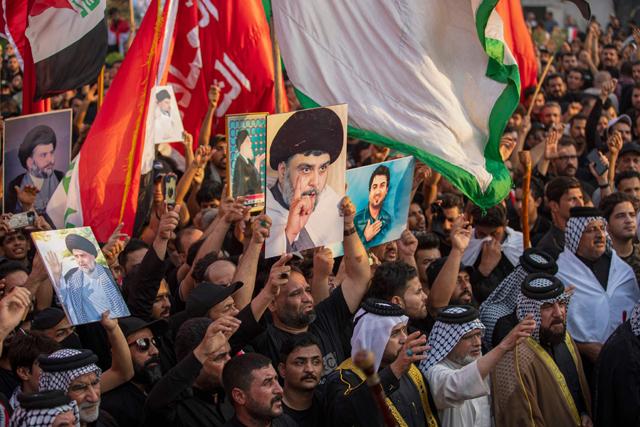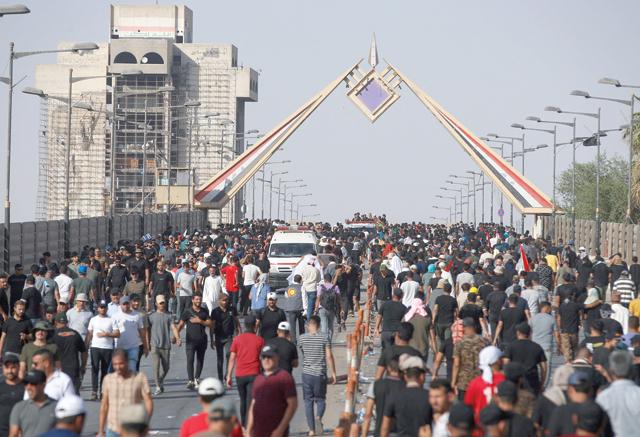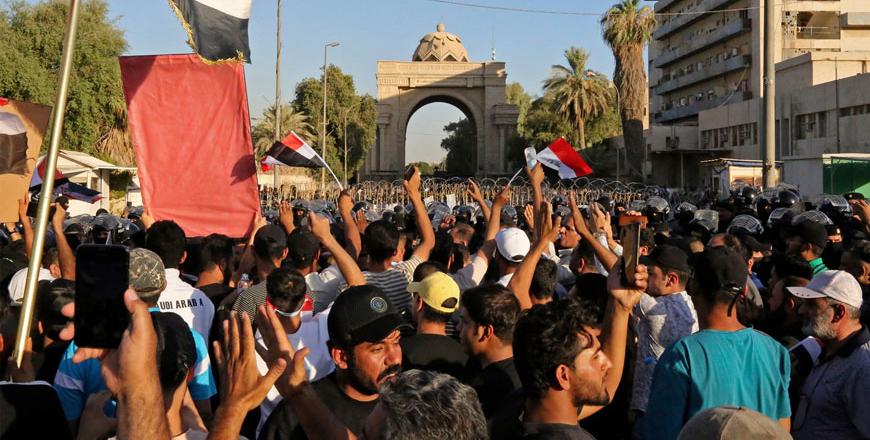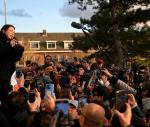You are here
Hundreds camp at Iraqi parliament for second day
By AFP - Jul 31,2022 - Last updated at Jul 31,2022
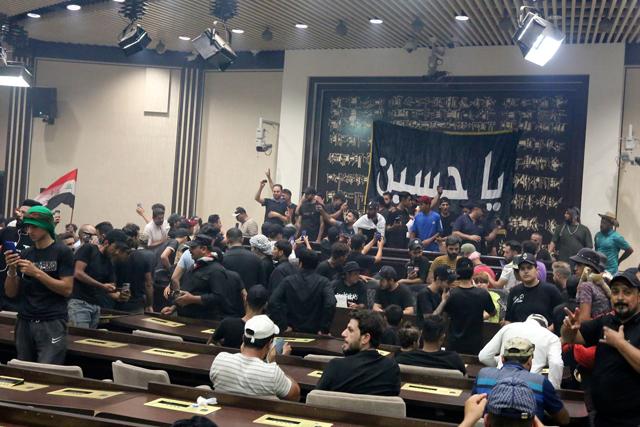
Supporters of Iraq’s powerful Shiite preacher Moqtada Sadr, protesting against a rival bloc’s nomination for prime minister, occupy Iraq’s parliament in Baghdad’s high-security Green Zone, on Sunday (AFP photo)
BAGHDAD — Hundreds of followers of powerful Iraqi Shiite preacher Moqtada Sadr camped at the country’s parliament on Sunday for a second day, protesting against corruption and political mismanagement.
Despite tear gas, water cannon and baking temperatures that touched 47ºC, they stormed the complex on Saturday after pulling down heavy concrete barricades on roads leading to Baghdad’s fortified Green Zone of diplomatic and government buildings.
The health ministry said at least 100 protesters and 25 security personnel were hurt in the confrontation.
Nearly 10 months after October elections, Iraq is still without a new government despite intense negotiations between factions.
Analysts have said Sadr, a mercurial cleric who once led a militia against US and Iraqi government forces, is using street protests to signal that his views must be taken into account in any government formation.
Both the United Nations and European Union warned about escalating tensions.
The immediate trigger for the occupation was the decision by a rival Shiite bloc, which is pro-Iran, to pick former Cabinet minister Mohammed Shia Al Sudani for the prime minister’s post.
On Sunday morning, the demonstrators marked the Muslim month of Muharram, a traditional Shiite celebration, with religious chants and collective meals.
“We were hoping for the best but we got the worst. The politicians currently in parliament have brought us nothing,” said one of the protesters, Abdelwahab Al Jaafari, 45, a day labourer with nine children.
Volunteers distributed soup, hard-boiled eggs, bread and water to the protesters.
Some had spent the night inside the air-conditioned building — which dates from dictator Saddam Hussein’s era — with blankets spread out on the marble floors.
Others took to the gardens, on plastic mats under palm trees.
Logjam
In multi-confessional and multiethnic Iraq, government formation has involved complex negotiations since a 2003 US-led invasion toppled Hussein.
Sadr’s bloc emerged from elections in October as the biggest parliamentary faction, but still far short of a majority.
In June, his 73 lawmakers quit in a bid to break a logjam over the establishment of a new government.
That led to a pro-Iran bloc becoming the largest in parliament, but still there was no agreement on naming a new prime minister, president or Cabinet.
The occupation that began on Saturday was the second time within a week that Sadr’s supporters had forced their way into the legislative chamber.
They left on Sadr’s orders last Wednesday after about two hours inside.
The protests are the latest challenge for a country trying to overcome decades of war and now facing the impact of climate change.
Despite oil wealth and elevated global crude prices, Iraq remains hobbled by corruption, unemployment and other woes, which sparked a youth-led protest movement in 2019.
As a result of past deals, the Sadrists also have representatives at the highest levels of government ministries and have been accused by their opponents of being as corrupt as other political forces.
But protesters see in Sadr an opposition figure and champion of the anti-corruption fight.
One of them, Oum Hussein, 42, said the sit-in sought a government of “people with integrity who serve the country”.
She accused Sadr’s opponents of choosing for a new government figures “known for corruption”.
Sudani is the prime ministerial choice of the Coordination Framework alliance which includes lawmakers from the party of Sadr’s longtime foe, ex-prime minister Nuri Al Maliki.
It also represents the pro-Iran former paramilitary group Hashed Al Shaabi, now integrated into the regular forces.
On Sunday, a spokesperson for the European Union expressed concern about “the ongoing protests and their potential escalation”.
The EU called for “constructive political dialogue”.
United Nations Secretary General Antonio Guterres urged “peaceful and inclusive dialogue” to form an effective national government, his spokesperson said.
Iraqi Kurdish authorities in the country’s north offered to host talks in their capital Erbil.
Related Articles
BAGHDAD — Thousands of Iraqis took to the streets of Baghdad Monday in counter-protests as rival supporters of Shiite Muslim cleric Moqtada
BAGHDAD — Supporters of powerful Iraqi cleric Moqtada Sadr penetrated Baghdad's heavily fortified Green Zone on Saturday, occupying parliame
BAGHDAD — Supporters of powerful Iraqi cleric Moqtada Sadr on Wednesday danced and sang after storming parliament in the capital's high-secu


